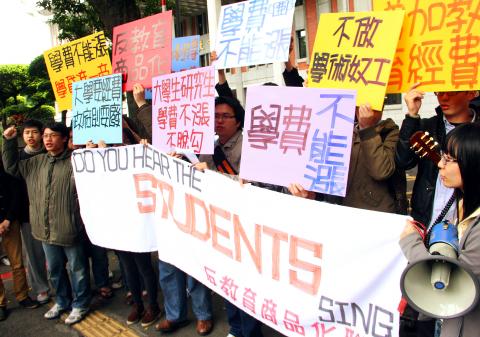Dozens of students yesterday demonstrated outside the Ministry of Education in Taipei, protesting its decision to allow universities to independently decide whether to raise tuition fees for graduate programs. The students expressed concern that the decision may result in a increase in fees for graduate students.
In a conference meeting with university and college presidents from across the nation last month, Minister of Education Chiang Wei-ling (蔣偉寧) said that school administrations would be free to decide whether to raise tuition fees for graduate programs, making many students worried that they may become an “ATM” for their schools.
“When students finish their degree, they go out and contribute to society based on what they have learned at school. Students should not be the ones who shoulder the rising costs of education,” said Chang Wen-hua (張文華), a graduate student at Taipei National University of the Arts and a representative of the Alliance Against Commoditization of Education. “Instead, the government should collect capital gains tax from businesses to fill universities’ financial gap, as most students go on to work for businesses after graduation.”

Photo: CNA
Chang said that graduate students are already suffering from cuts in research funds and that “things would only get worse for us if tuition fees go up and research budgets are cut.”
“We would become academic slave workers,” she added.
“I get a research budget of about NT$3,000 [US$101] a month, but 10 years ago, the amount was NT$8,000,” said Wang Chun-fang (王淳芳), a graduate student at National Chengchi University.
“With little budget and higher tuition fees, we will be forced to work multiple part-time jobs. How are we supposed to focus on our studies and do our research?” she asked.
Responding to the students’ protest, Department of Higher Education deputy director Ma Hsiang-ping (馬湘萍) said that because graduate school is not part of mandatory education, “it’s reasonable that the government, the school and the students should share the costs.”
“We are not likely to change the policy direction at the moment,” she said. “However, I don’t think universities are planning to raise tuition fees for graduate students, because competition is fierce because the number of children is declining each year.”

Taiwan is stepping up plans to create self-sufficient supply chains for combat drones and increase foreign orders from the US to counter China’s numerical superiority, a defense official said on Saturday. Commenting on condition of anonymity, the official said the nation’s armed forces are in agreement with US Admiral Samuel Paparo’s assessment that Taiwan’s military must be prepared to turn the nation’s waters into a “hellscape” for the Chinese People’s Liberation Army (PLA). Paparo, the commander of the US Indo-Pacific Command, reiterated the concept during a Congressional hearing in Washington on Wednesday. He first coined the term in a security conference last

Prosecutors today declined to say who was questioned regarding alleged forgery on petitions to recall Democratic Progressive Party (DPP) legislators, after Chinese-language media earlier reported that members of the Chinese Nationalist Party (KMT) Youth League were brought in for questioning. The Ministry of Justice Investigation Bureau confirmed that two people had been questioned, but did not disclose any further information about the ongoing investigation. KMT Youth League members Lee Hsiao-liang (李孝亮) and Liu Szu-yin (劉思吟) — who are leading the effort to recall DPP caucus chief executive Rosalia Wu (吳思瑤) and Legislator Wu Pei-yi (吳沛憶) — both posted on Facebook saying: “I

The Ministry of Economic Affairs has fined Taobao NT$1.2 million (US$36,912) for advertisements that exceed its approved business scope, requiring the Chinese e-commerce platform to make corrections in the first half of this year or its license may be revoked. Lawmakers have called for stricter enforcement of Chinese e-commerce platforms and measures to prevent China from laundering its goods through Taiwan in response to US President Donald Trump’s heavy tariffs on China. The Legislative Yuan’s Finance Committee met today to discuss policies to prevent China from dumping goods in Taiwan, inviting government agencies to report. Democratic Progressive Party Legislator Kuo Kuo-wen (郭國文) said

Sung Chien-liang (宋建樑), who led efforts to recall Democratic Progressive Party (DPP) Legislator Lee Kun-cheng (李坤城), was released on bail of NT$80,000 today amid outcry over his decision to wear a Nazi armband to questioning the night before. Sung arrived at the New Taipei District Prosecutors’ Office for questioning in a recall petition forgery case last night wearing a red armband bearing a swastika, carrying a copy of Adolf Hitler’s Mein Kampf and giving a Nazi salute. Sung left the building at 1:15am without the armband and covering the book with his coat. Lee said today that this is a serious